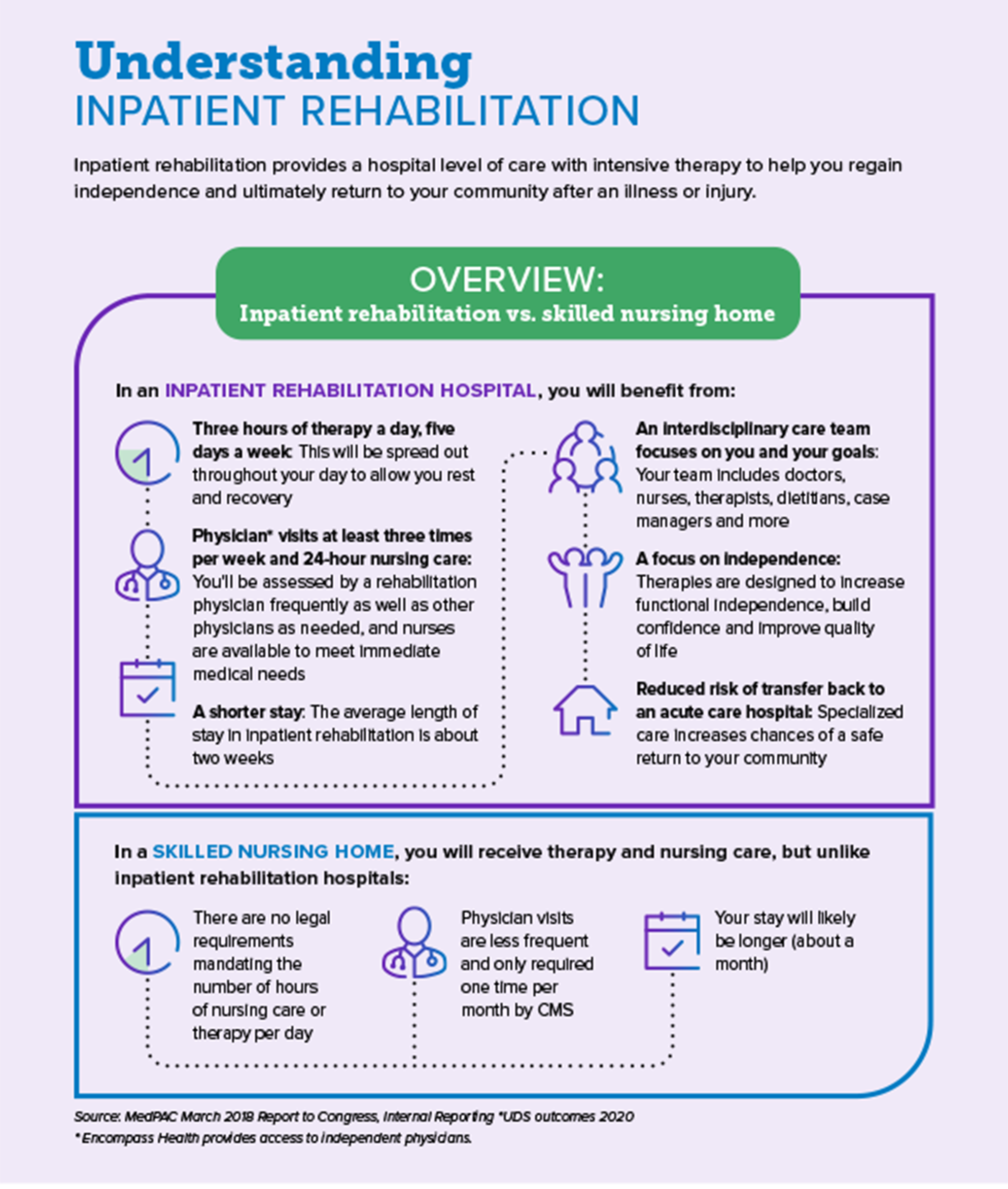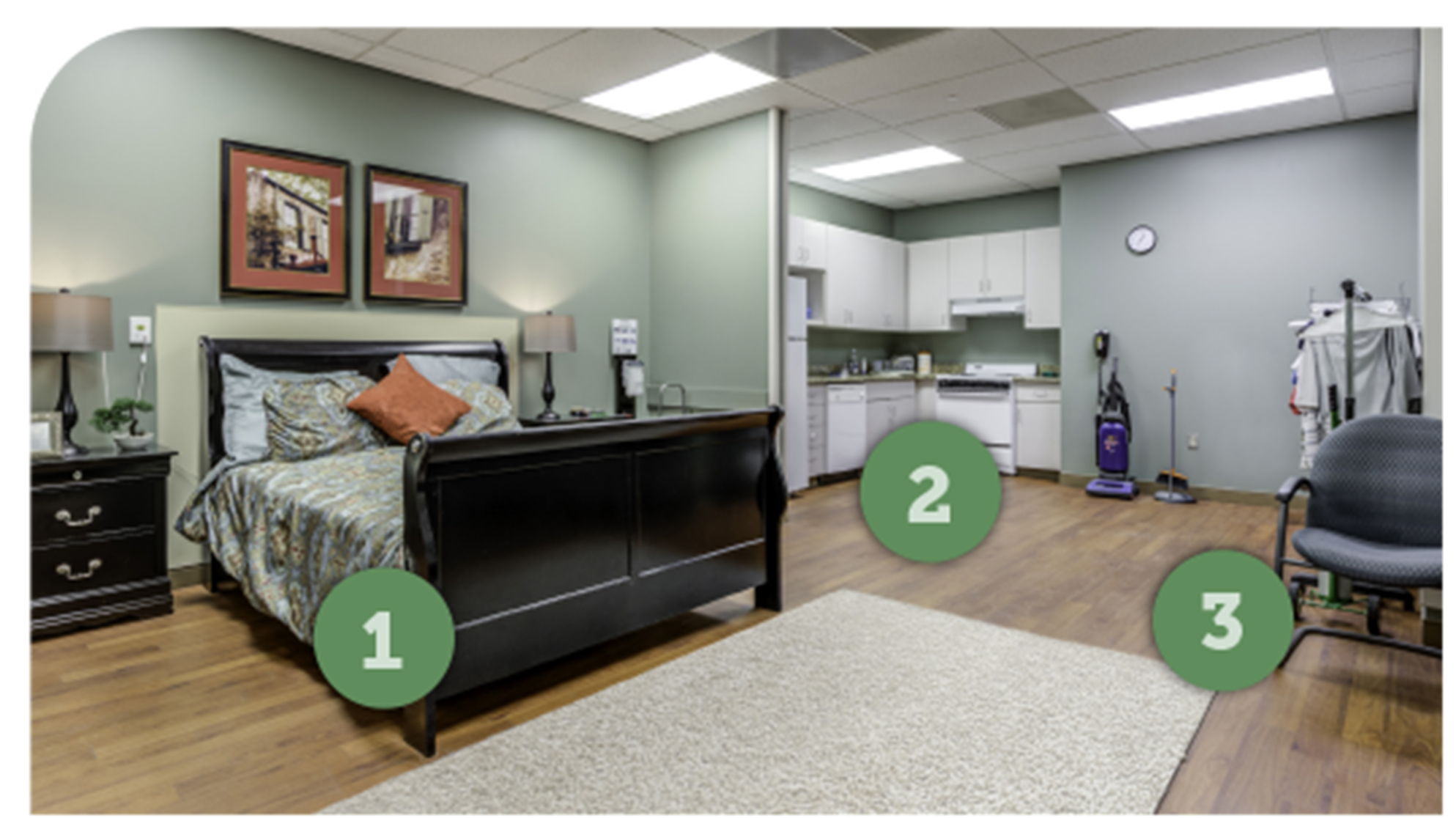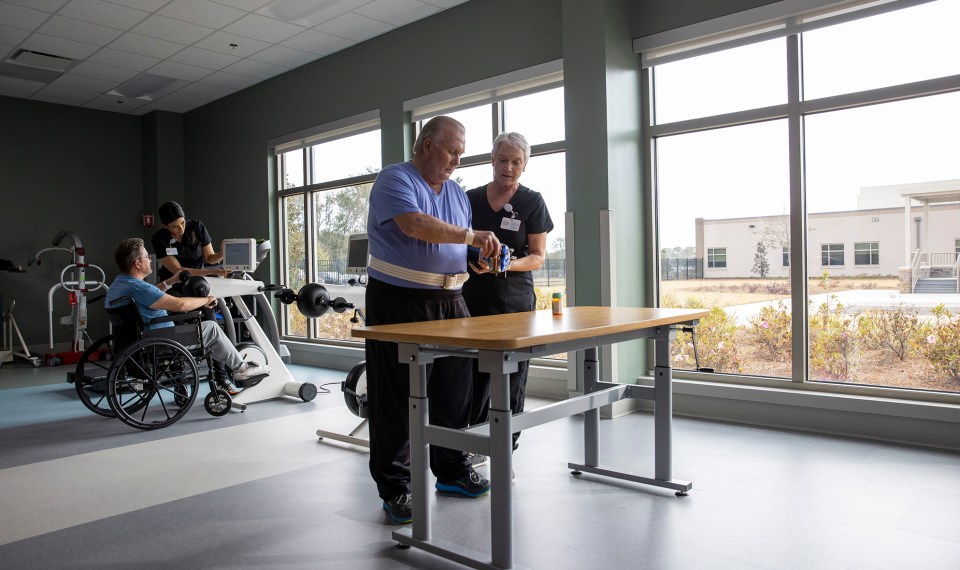Want to learn more about inpatient rehabilitation and if you or a loved one could benefit from this level of care? Download our free guide created by our rehabilitation experts.
A Letter from Dr. Lisa Charbonneau

After a serious illness or injury, you and your loved ones might be wondering what’s next. You want to be home, and you want to get back to those activities that matter most to you.
However, you need to build up your strength in order to do all those things safely. As the nation’s leading provider of inpatient rehabilitation, that is what we strive to help you do at Encompass Health. Combining a hospital level of care with physical, occupational and speech therapy, we create individualized plans to help you achieve your unique goals.
As a patient, you have a right to choose the care you receive, and we want to ensure you have the tools and knowledge you need to make the right choice to get back home and to what matters most.
Table of Contents
What is Inpatient Rehabilitation?
Inpatient rehabilitation provides a hospital level of care with intensive therapy to help you regain your independence and ultimately return to your community after an illness or injury.
While at an inpatient rehabilitation hospital, you will receive three hours of therapy a day, five days a week. You will also have frequent visits from a rehabilitation physician and other physicians, depending on your needs. Nursing care is provided 24 hours a day, and a multi-disciplinary team that includes rehabilitation physicians, nurses, therapists, dietitians, pharmacists and case managers will design a unique care plan to fit your goals.
Conditions commonly treated at rehabilitation hospitals include stroke, head or spinal cord injuries, neurological disorders such as Parkinson’s and multiple sclerosis, amputation and hip fractures.

Your Care Team
Inpatient rehabilitation uses a collaborative approach that brings clinicians, yourself and your caregivers together to develop plans that fit your needs and goals. Throughout your stay, your care team meets weekly to access your progress and adjust as needed.
Care includes
- Visits from your rehabilitation physician at least three days per week
- Physical therapy to help increase physical function, mobility, strength, balance and safety
- Occupational therapy to promote independence in self-care, home management and work skills
- Respiratory therapy to help patients with their lungs and respiratory system if their breathing is affected by injury or surgery
- Speech-language pathology to help overcome communication disorders, speech challenges and swallowing problems
- Dietary care from registered dietitians who oversee each patient’s meals to ensure proper nutrition
- 24/7 nursing care, many of whom are certified in rehabilitation
- On-site medical specialty care such as internal medicine, infection specialists and wound care as needed
Getting Back to Everyday Activities
A big part of your rehabilitation will be working on your activities of daily living, also known as ADLs. These are the everyday activities that, prior to your injury or illness, you performed automatically. They can include tasks such as eating, grooming and personal hygiene.
In addition to ADLs, your rehabilitation should also focus on instrumental activities of daily living or iADLs. These are more complex but equally important to your recovery and helping you regain your highest level of independence. They include preparing meals, managing finances and keeping track of medications.
At Encompass Health, ADL suites help you practice both ADLs and iADLs in a safe but realistic setting. ADL suites feature a kitchen, bathroom and bedroom.

ADL suites could include:
- A bedroom and bathroom to help you practice safely getting in and out of bed and performing personal hygiene tasks
- A kitchen, so you can work with therapists to practice daily tasks such as cooking, cleaning, reaching and more
- Common household items such as vacuum cleaners and laundry supplies so you can practice these tasks in a safe space
What to Expect During Your Stay
If you choose inpatient rehabilitation, depending on your provider, you are likely to expect the following:
Preparing for Admission
When you’re ready, a liaison from the rehabilitation provider will gather information to assure you meet the requirements for admission and submit it for authorization if required by your medical insurance. Your liaison should provide you and your loved ones with a checklist of items to bring so you are comfortable and answer any questions or concerns.
After Your Admission
After you are admitted, you will meet your case manager. Your case manager is your primary contact throughout your stay and will coordinate your plan of care and ensure you and your loved ones are updated on your progress.
On your first day you’ll also meet your care team and complete a detailed assessment of your medical and rehabilitation needs. This first step enables your care team to create a personalized rehabilitation plan to help you achieve your specific recovery goals.
Your Care Team
Your care team will meet weekly to discuss your progress and adjust your plan to keep you moving forward. After each team conference your case manager will meet with you to discuss progress and any updates to your plan of care, including your estimated discharge date. Your care team includes nurses, therapists, a rehabilitation physician, pharmacists, dietitians and more.
Your Daily Routine
You can expect at least three hours of therapy, five days a week. Your schedule will include physical therapy and occupational therapy, as well as speech therapy and respiratory therapy, if necessary. Therapy sessions are typically scheduled for morning or afternoon, leaving you to enjoy your evenings and get plenty of rest.
Your nurses will help you prepare for each day and ensure you have what you need to be safe and comfortable. Your nurses will also regularly check your vital signs, help with medication and ensure you are feeling well.
Your loved ones are an important part of your recovery. They are encouraged to visit during visiting hours as often as possible.
Discharge Process
A case manager will work with your care team to develop a discharge plan that works best for you and your loved ones. Let them know any concerns you have about your next setting of care. They can also connect you to resources in the community and any medical equipment you might need after you leave the rehabilitation hospital.
Frequently Asked Questions
Will my care be covered in an inpatient rehabilitation hospital?
Health insurance coverage typically includes rehabilitation hospital care, but coverage does vary. Ask your insurer whether you need to obtain prior authorizations, stay in a specific network or be aware of any other considerations.
Will I need prior authorization with Medicare?
Medicare does not require prior authorization for inpatient rehabilitation. But your doctor must certify that you have a medical condition that requires intensive rehabilitation, continued medical supervision and a care team with doctors and therapists working together.
What is required for me to become eligible for inpatient rehabilitation?
No prior hospital stay is necessary to be admitted to a rehabilitation hospital (unlike coverage requirements for care at a skilled nursing facility/nursing home). But if you have commercial health insurance or a Medicare Advantage plan, you may need prior authorization.
Medicare Part B (medical insurance) is designed to cover your medical care:
- Doctor appointments
- Preventive care
- Medically necessary supplies such as a wheelchair
- Your deductible still applies for doctor visits
What costs can I expect with my Medicare benefits?
Medicare doesn’t cover your deductible (the money you must pay before your coverage will start to apply). Part A also doesn’t cover your coinsurance (the percentage of costs you must pay after you meet your deductible). You can either pay for your deductible and coinsurance yourself or get an additional Medicare plan (called a supplemental plan) to cover those costs not covered by/included in Part A.
Can I request inpatient rehabilitation if my doctor recommends a different setting of care?
Yes, you can. You have a right to choose your care setting or request a particular provider. Your doctor must confirm that inpatient rehabilitation is medically necessary for your recovery.
What does “medically necessary” mean?
The term “medically necessary” depends on the care setting. For inpatient rehabilitation your doctor can refer you if you need physician visits, 24-hour nursing care and intense therapy to help you recover safely before returning home.
How long will my stay be?
That depends on the complexity of your condition, but the average length of stay at an inpatient rehabilitation hospital is about two weeks, compared to that of a skilled nursing facility or nursing home, which is about a month.
What will my treatment look like?
At an inpatient rehab hospital, you will receive care customized to your recovery goals. Your interdisciplinary team includes doctors, nurses, pharmacists, case managers, dietitians and physical, occupational and speech therapists. You will receive three hours of therapy a day, five days a week that will be spread out throughout the day. Rehabilitation physicians will evaluate your progress multiple times a week, and the care team meets frequently to discuss your goals and shape your treatment plan accordingly.
Can my family visit?
Family plays an important role in your rehabilitation. Visitors are welcomed, but check with your location on specific visiting hours. Your case manager will meet with you and your family before discharge to address your questions and concerns.
The content of this site is for informational purposes only and should not be taken as professional medical advice. Always seek the advice of your physician or other qualified healthcare provider with any questions you may have regarding any medical conditions or treatments.



